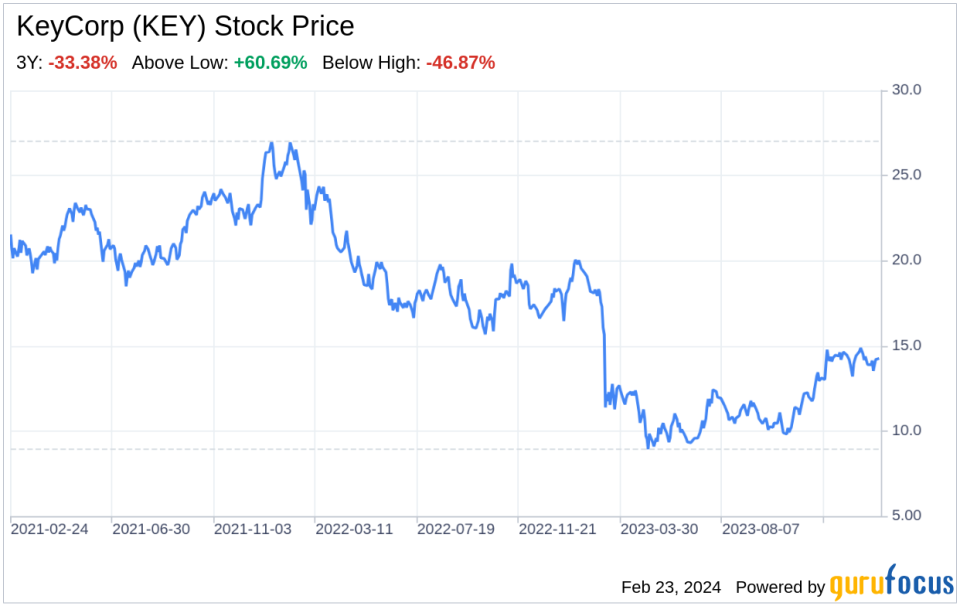Decoding KeyCorp (KEY): A Strategic SWOT Insight
KeyCorp's strong market presence in Ohio and New York as a competitive advantage.
Challenges in commercial real estate and credit exposure as potential weaknesses.
Opportunities for growth in digital banking and capital markets services.
Threats from increased competition and regulatory pressures.
On February 22, 2024, KeyCorp (NYSE:KEY), a prominent bank-based financial services company, filed its annual report (10-K) with the SEC, providing a comprehensive overview of its financial performance for the fiscal year ended December 31, 2023. With consolidated total assets of approximately $188.3 billion, KeyCorp's financial foundation remains robust, reflecting its strategic positioning in the market. The company's extensive network, including 959 full-service retail banking branches and 1,217 ATMs across 15 states, underscores its significant footprint in the financial landscape. KeyCorp's financial tables reveal a solid balance sheet, with a notable aggregate market value of voting and non-voting common stock held by nonaffiliates totaling over $8.6 billion as of mid-2023. This financial overview sets the stage for a deeper SWOT analysis, highlighting KeyCorp's strengths, weaknesses, opportunities, and threats as gleaned from the latest 10-K filing.

Strengths
Market Dominance in Core Regions: KeyCorp's significant presence in Ohio and New York provides it with a competitive edge in these markets. The company's deep-rooted connections and comprehensive understanding of local economies enable it to tailor services effectively to client needs. This regional dominance is supported by a vast network of branches and ATMs, ensuring accessibility and convenience for customers. Moreover, KeyCorp's strong brand recognition within these core markets contributes to customer loyalty and retention, which are crucial for sustained revenue streams.
Diversified Financial Services: KeyCorp offers a broad spectrum of financial products and services, including retail and commercial banking, investment management, and capital markets services. This diversification allows the company to cater to a wide range of customer needs, from individual banking to complex institutional financial solutions. The diversity in services not only mitigates risks associated with market fluctuations but also positions KeyCorp to capitalize on cross-selling opportunities, enhancing its revenue potential.
Robust Capital and Liquidity Position: KeyCorp's capital adequacy ratios, including Tier 1 capital and Common Equity Tier 1, indicate a strong capital base that exceeds regulatory requirements. This robust capital structure provides a buffer against potential financial shocks and supports the company's growth initiatives. Additionally, KeyCorp's prudent liquidity management ensures it has sufficient funds to meet its obligations, contributing to financial stability and investor confidence.
Weaknesses
Concentrated Credit Exposure: KeyCorp's loan portfolio exhibits a concentrated credit exposure in commercial and industrial loans, which could pose risks if economic conditions deteriorate in these sectors. Such concentration increases the potential for significant credit losses, impacting the company's financial health. Diversifying the loan portfolio could mitigate this risk, but it remains a notable weakness that requires ongoing attention and strategic management.
Commercial Real Estate Market Sensitivity: The company's involvement in commercial real estate lending and servicing exposes it to the cyclical nature of real estate markets. Deterioration in market fundamentals, such as declining asset prices or defaults by loan clients, could lead to increased credit losses and impairments. This weakness underscores the need for vigilant risk assessment and proactive measures to navigate the volatile real estate landscape.
Operational and Cybersecurity Risks: As a financial institution, KeyCorp faces operational risks, including those associated with technology systems and cybersecurity threats. Breaches or failures could result in significant financial and reputational damage. Despite having controls and procedures in place, the evolving nature of cyber threats presents a persistent challenge that requires continuous investment in security measures.
Opportunities
Digital Banking Expansion: The shift towards digital banking presents KeyCorp with opportunities to expand its online and mobile banking capabilities. By investing in digital platforms, such as its national digital bank, Laurel Road, KeyCorp can attract tech-savvy customers, enhance user experience, and improve operational efficiency. This strategic focus on digital innovation positions the company to capture a larger market share in the growing fintech space.
Capital Markets and Investment Banking Growth: KeyCorp's Commercial Bank segment, including the KeyBanc Capital Markets (KBCM) platform, offers significant opportunities for growth in capital markets and investment banking services. By leveraging its expertise in sectors such as healthcare, technology, and energy, KeyCorp can expand its client base and increase revenue from high-margin services like syndicated finance, derivatives, and financial advisory.
Strategic Acquisitions and Partnerships: KeyCorp has the opportunity to pursue strategic acquisitions and partnerships that align with its business objectives. These initiatives can provide access to new markets, technologies, and talent, driving growth and innovation. Additionally, collaborations with fintech companies could enhance KeyCorp's product offerings and competitive positioning in the rapidly evolving financial services industry.
Threats
Intensifying Competition: The financial services industry is highly competitive, with KeyCorp facing pressure from both traditional banks and non-bank entities, including fintech firms. These competitors may have fewer regulatory constraints or more innovative offerings, challenging KeyCorp's market share. The company must continuously innovate and adapt to maintain its competitive edge in this dynamic environment.
Regulatory and Compliance Burdens: KeyCorp operates in a heavily regulated industry, and changes in laws, regulations, or accounting standards could increase compliance costs or restrict business activities. Additionally, heightened scrutiny on environmental, social, and governance (ESG) practices adds complexity to the company's operations. Navig
This article, generated by GuruFocus, is designed to provide general insights and is not tailored financial advice. Our commentary is rooted in historical data and analyst projections, utilizing an impartial methodology, and is not intended to serve as specific investment guidance. It does not formulate a recommendation to purchase or divest any stock and does not consider individual investment objectives or financial circumstances. Our objective is to deliver long-term, fundamental data-driven analysis. Be aware that our analysis might not incorporate the most recent, price-sensitive company announcements or qualitative information. GuruFocus holds no position in the stocks mentioned herein.
This article first appeared on GuruFocus.
